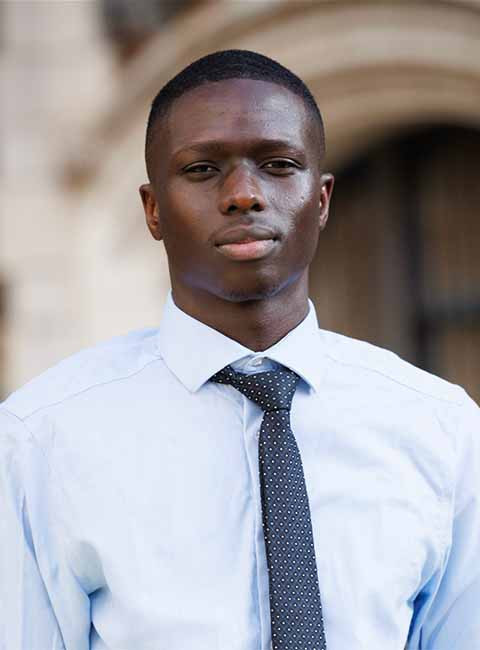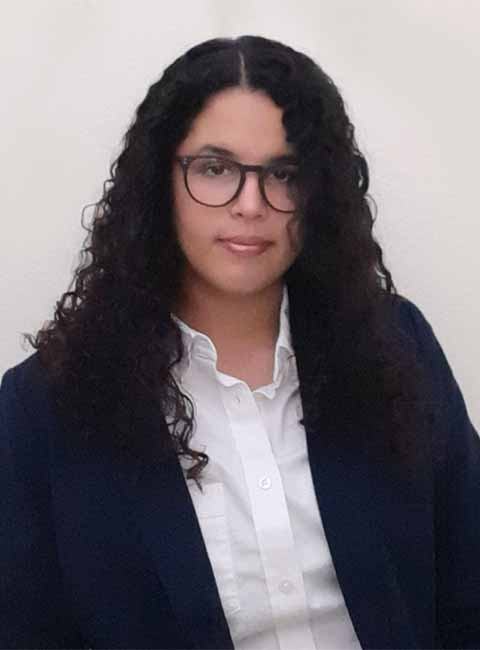
The TRB Minority Fellows Program, established by The Transportation Research Board (TRB) and the U.S. Federal Highway Administration (FHWA) in 2010, aims to actively explore research, ideas, and solutions from diverse perspectives. This program seeks to increase the number of underrepresented communities in the transportation field and in TRB activities.
In celebration of our commitment to developing future transportation leaders and in honor of our former President and CEO, Lance Neumann, Cambridge Systematics launched an annual scholarship program in 2021 to help two TRB Minority Student Fellows travel to and attend the TRB Annual Meeting to present their research.
Introducing our scholarship recipients for 2024: Ibrahima Fall and Marielly Rodriguez Gauthier. We had the opportunity to ask them about their research and the changes they hope to see in transportation.

Ibrahima Fall.

Marielly Rodriguez.
What’s your favorite transportation-related fact, and why?
Marielly: I find it funny that there is an island with motor-free transportation. On Mackinac Island, everything travels by horse. Ironically, it is located in Michigan, the birthplace of Ford.
Ibrahima: One of my favorite transportation-related facts centers around the George Washington Bridge, which holds the distinction of being the most heavily used bridge in the United States. What truly captivates me about this bridge is its remarkable history; it was initially constructed in 1927 and has managed to maintain its structural integrity to the present day. This enduring legacy serves as a testament to the pivotal role that bridges play in our everyday lives, enabling vital connections among people from diverse locations. The bridge's ability to withstand the test of time underscores its significance in supporting the functioning of our modern society and economy. Its story is a compelling reminder of the enduring importance of transportation infrastructure.
How did you come across the research topic of your presentation at the TRB Annual Meeting, and what excites you about it?
Marielly: I found this research topic when I was networking in the summer of 2021. I met people in the Consortium of Hybrid Resilient Energy Systems, and they were looking for someone with my background and skill set for a research internship. What excited me was how hands-on the work was. I went on field deployment, gathered information, tested prototypes, and troubleshot sensor network problems. It was exciting working in a lab, designing and making things that I would later see in the field.
Ibrahima: I came across the research topic for my presentation at the TRB Annual through a combination of factors. Initially, my professor, Naresh Devineni, was working on a related project, and I was naturally curious about his work. When he provided me with a brief explanation of his research on the reliability of highway bridges, I found it quite intriguing. However, what truly excited me was the realization of the significant impact climate change can have on our transportation systems. The prospect of delving into this critical intersection of infrastructure and environmental sustainability fascinated me, and I was motivated to explore it further through my research. This topic's relevance and potential for positive change are what excite me the most about presenting it at TRB Annual.
What drew you to this field, and how can the industry encourage more students to pursue a career in transportation?
Marielly: One of the things that drew me to this field is that in Puerto Rico, where I come from, transportation is heavily affected by natural disasters, such as flooding and earthquakes. The project I worked on could have great applications for the environmental monitoring of places where transportation and infrastructure are prone to serious damage caused by natural disasters.
Ibrahima: I was drawn to the field of transportation due to its significant impact on our daily lives and the broader economy, sparking my interest in making these systems more efficient and sustainable. The multidisciplinary nature of transportation structures, blending engineering, urban planning, environmental science, and technology, presented an exciting opportunity for personal growth and learning. To encourage more students to pursue careers in transportation, the industry can take several steps. These include educational outreach, mentorship programs, scholarships and grants, and networking opportunities.
What kind of changes do you hope to see in transportation in the next 10 years?
Marielly: I hope to see the integration of smart devices embedded with sensors and actuators that monitor the physical world and can respond to and mitigate the effects of environmental events. I hope to see the development and implementation of smart, sustainable, and eco-friendly technology, such as better drainage systems and transportation, that can be resilient to natural disasters by using fast-responding technology that can assess and control damage.
Ibrahima: In the next 10 years, I hope to witness significant advancements in transportation. I look forward to a stronger emphasis on sustainability with the widespread adoption of electric and alternative-fuel vehicles. I also anticipate more efficient and accessible public transportation, with an expanded focus on smart infrastructure and innovative solutions to reduce traffic congestion. Finally, resilience to climate change and universal accessibility should become integral aspects of our transportation systems, contributing to a more sustainable, efficient, and inclusive future.
What’s the best way to connect with you?
Marielly: You can email me at marielly.rodriguez1@upr.edu.
Ibrahima: The most effective way to reach me is by sending a message through my LinkedIn account.
Check out Ibrahima and Marielly's presentations during the TRB Minority Student Fellows Poster Session
January 9th, 2024
10:15am-12:00pm
Convention Center, Hall A
Marielly: Temperature Analysis for Remote Wireless Sensor Networks Sustainability: Challenges and Proposed Solutions
Ibrahima: The Impact of Climate-Induced Changes on Highway Bridge Reliability: A Case Study in the Northeast United States
Thank you, Ibrahima and Marielly, for taking the time to speak with us. We hope you have a wonderful time at the TRB Annual Meeting, and we can’t wait to hear about what you accomplish in the next steps of your transportation careers!